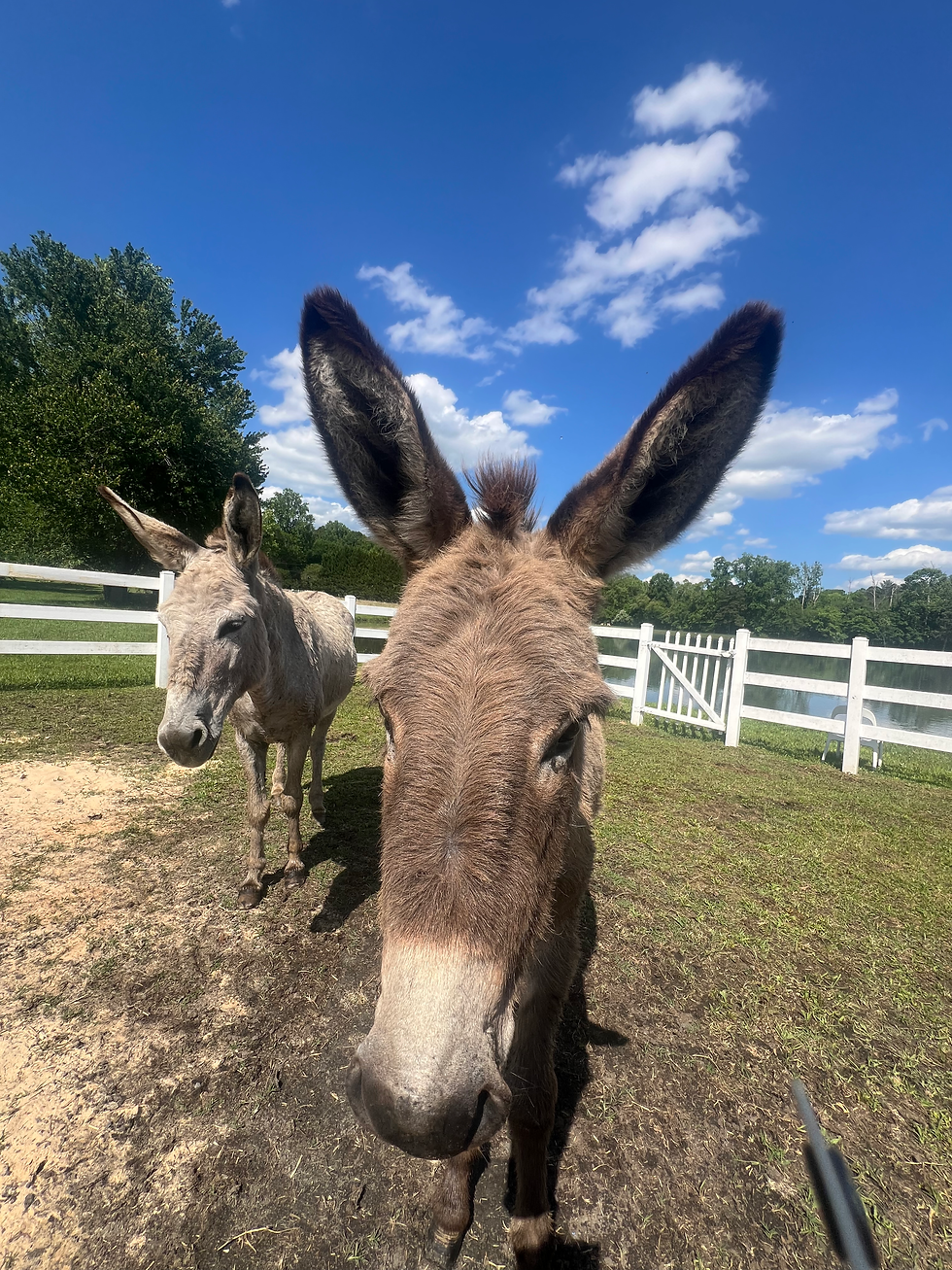Lessons From the Pasture: What I’ve Learned About Caring for Donkeys
- Kelsey Dolan

- Oct 6, 2025
- 3 min read
By Kelsey Dolan, Stella’s Rescue – Winston-Salem, NC
We rescued our donkeys not only because they needed a safe home, but also because they help protect the other animals here at Stella’s Rescue from coyotes. Donkeys are incredible guardians, they are loyal, alert, and surprisingly brave when something threatens their herd. They take their job seriously. So seriously, in fact, that they still put our dogs in the same “potential threat” category, which means we have to keep them separated. It’s all love, just with a little healthy suspicion on their part.

When we started rescuing donkeys at Stella’s Rescue, I thought I knew what to expect: a few stubborn moments, some loud brays, and a lot of brushing. What I didn’t realize was how much these sweet, long-eared souls would teach me about patience, care, and connection. Each one has a story, and each day out in the pasture brings a new lesson, sometimes muddy, sometimes hilarious, but always rewarding.
Meet Judy and Eddy
Our two newest residents, Judy and Eddy, came to us last Spring, both un-fixed, both a little uncertain about their new surroundings, and both quickly stealing our hearts.
Judy, our shy girl, was rescued from a cattle farm where she wasn’t used to much human contact. At first, she kept her distance, always watching and always cautious. But over time, with (A LOT) brushing, quiet feeding, and plenty of space to trust on her own terms, she’s started warming up. These days, she’ll nudge me for scratches behind the ears, and her eyes have softened in a way that tells me she finally feels safe here.
When she arrived, we discovered something else: Judy is pregnant! So we’re officially on baby watch and looking forward to welcoming a tiny, fuzzy, bray-filled addition to the rescue soon.
Our vet advised us to wait until fall to have both Judy and Eddy fixed, once the weather cools down and the flies die off a bit. That way, their healing won’t be complicated by insects or summer heat. For now, they’re separated, close enough to see each other but with a sturdy fence between them, keeping things calm, safe, and drama-free.
The Donkey Diet: What to Eat (and What to Avoid)
One of the first lessons I learned is that not all grass is good grass. Donkeys have sensitive systems, and their natural diet is much leaner than what most pastures provide.
We’re careful to keep them away from sweet, rich grass and anything that grows fast after a rain. That kind of lush growth can be too sugary and cause serious health problems like laminitis. We also watch out for poisonous plants and flowers, especially buttercups, ragwort, and nightshade, which can sneak their way into the pasture if we’re not paying attention.
Their hay is dry, mature, and unsweetened, and they always have access to mineral blocks and fresh water. It’s simple, but it keeps them healthy and happy. And no one complains when there are a few crunchy carrots thrown in for good behavior.

Fly Season: A Daily Battle (But One We Can Win)
If you’ve ever spent a North Carolina summer in a pasture, you know that flies are relentless. Over the years, I’ve tried every commercial spray out there, but the best solution turned out to be something we make ourselves.
Here’s what works for us:
Homemade Fly Spray – Mix apple cider vinegar, water, a few drops of eucalyptus or citronella essential oil, and a splash of dish soap. Shake well and spray daily. It’s natural, effective, and surprisingly pleasant-smelling.
Fly Boots and Masks – These lightweight mesh guards protect their legs and faces from bites. We clean them regularly so they stay comfortable.
Painting for Healing – For small wounds or bug bites, we literally grab a paintbrush to apply ointment or fly salve. The brush lets us reach tender spots gently, without rubbing or irritating the skin, and it’s oddly satisfying to “paint” a donkey in the name of healing.

What the Donkeys Have Taught Me
Every day at Stella’s Rescue reminds me that healing takes time and trust. Judy and Eddy have already shown such resilience, adapting to new routines, new people, and a new sense of safety.
They’ve taught me that love sometimes looks like early morning feed checks, muddy boots, and the hum of a fly sprayer on a hot afternoon. It’s not glamorous, but it’s deeply meaningful work.
At Stella’s Rescue, we believe every donkey deserves a safe home, gentle care, and the chance to just be a donkey. And if we’re lucky, maybe a few surprise baby brays along the way.
If you’d like to learn more about supporting or volunteering with us, visit Stella’s Rescue or reach out on social. Every helping hand and heart makes a difference.



Comments